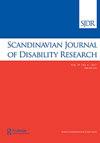“即使是自我倡导也需要买牛奶”——自闭症和智障运动中自我倡导的经济障碍
IF 1.3
Q2 REHABILITATION
引用次数: 5
摘要
自闭症患者和智障人士积极参与残疾宣传;然而,仍然经常是家长和专业人士领导组织代表他们说话。先前的研究发现,自闭症自我倡导者和智障自我倡导者在残疾运动中被系统地边缘化了。本文通过对英国和匈牙利两个国家收集的数据进行定性分析,评估了经济因素如何影响自我倡导者在残疾运动中的地位。研究发现,缺乏资源、贫困和无薪职位严重阻碍了自我倡导者参与倡导/残疾人权利组织,为他们说话。调查结果还表明,残疾人组织的做法可能有助于维持这些障碍。本文章由计算机程序翻译,如有差异,请以英文原文为准。
‘Even a Self-Advocate Needs to Buy Milk’ – Economic Barriers to Self-Advocacy in the Autism and Intellectual Disability Movement
Autistic people and people with an intellectual disability have been actively involved in disability advocacy; however, it is still often parents and professionals who lead organisations speaking on their behalf. Previous studies have found that autistic self-advocates and self-advocates with an intellectual disability have been systematically marginalised in the disability movement. This article appraises how economic factors influence self-advocates’ position within the disability movement, based on qualitative analysis of data collected in two countries, the UK and Hungary. The study found that lack of resources, poverty and unpaid positions at organisations strongly hinder self-advocates’ participation in advocacy/disability rights organisations speaking for them. Findings also suggest that practices of disability organisations may contribute to maintaining these barriers.
求助全文
通过发布文献求助,成功后即可免费获取论文全文。
去求助
来源期刊

Scandinavian Journal of Disability Research
REHABILITATION-
CiteScore
3.20
自引率
0.00%
发文量
13
审稿时长
16 weeks
 求助内容:
求助内容: 应助结果提醒方式:
应助结果提醒方式:


